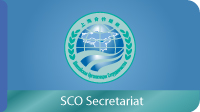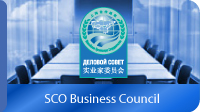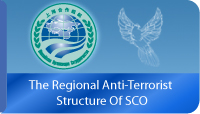|
|
 |
| University Unique in the World |
| 13.05.2009 13:48 |
|
|
|
Vladimir Kiuchariants, scientific reviewer – specially for InfoSCO
The most ambitious educational project ever implemented in the world – the SCO member states Network University – acquires visible features. For the participation in it a free-for all competition has been recently set up among Russia’s universities and higher education institutions of the Shanghai Cooperation Organization other countries.
Whenever will the real start of this unusual university take place? What will it be? What priorities are here and what are “reefs”? These and other questions are answered by one of the SCO University concept designers, noted Russian orientalist, Doctor of Historical Sciences, professor Aleksey MASLOV.
– You have said more than once that You consider the SCO University project as unique and the most ambitious for many decades. What is the ambitiousness?
– First of all, its goal itself – creation of a single Eurasian educational space combining the best national traditions and accepted world standards. And the fact that this project consolidates the states with different civilization communities, culture and absolutely unequal economies. It includes the countries with different possibilities, ambitions and educational potential. There are giants such as China, Russia, quite considerable Kazakhstan, and there are, say, Tajikistan, Uzbekistan, Kirghizia…
– One must suppose that their different interests and contributions are quite tangible, which means that antagonisms and problems are inevitable.
- A Chinese proverb runs like this: “A journey of a thousand miles begins with one step.” We have done already a lot of steps, which made it possible to remove many of them. For example, it was clear that the largest developments in all scientific areas were conducted in Russia and China, and it is these countries that very many people visit for education and training. There are much less people willing to go to other SCO countries. Thus, the conflict arises at the outset when main flows of students make their way to these big countries (Kazakhstan can be also included). It is necessary to be aware that just these countries cover most of professions. And here it is very important that the SCO University should not turn into a game of two or three large states. We tried that each country could find in it its own interest.
But there are countries’ ambitions and those of particular universities. And they do not always coincide. Some universities do not understand absolutely what their country’s interest here is. And first of all, it consists of creating of a new generation of specialists that will be able to work in the whole Eurasian space with different cultures and approaches to reality. And it is just one problem, whereas there were so much of them that there were strong doubts whether it was possible at all to create such a university. A single consolidation idea was required, a model meeting all countries’ ambitions, and above all – those of universities, under the aegis of which it will work.
– What model has proved to be so universal?
– The most consistent one. It was suggested by the Russian party and approved by all experts. The SCO University network principle is clearly prescribed in it. No single center. The university administration may be located anywhere. Students get educated alternately in different universities. Each country suggests on its behalf some leading higher education institutions representing the best scientific schools (say, in energy – China, Russia and Kazakhstan). Within their term of apprenticeship, students will undergo one third of study in one of the SCO member states. It will enable them to better know other ethnoses’ culture, be filled with ideas of Eurasian cooperation. For example, having begun to learn on his native soil, the Russian can go on then to do further study by the same profession in China or Kazakhstan. Consequently he will receive two diplomas. One is that of the institution he entered, the other is the SCO University’s. And we mean to train specialists not only of high proficiency, but also able to easy integrate into the SCO joint economy – that of the large part of the world, rapidly growing and having a very good prospect.
What is important in this conception? Above all it is our using a very well-tried system called a system of intercalation study. For example, a student studies at MGU till his 3rd year, for the 4th year he goes to China, then he returns for the 5th year in his university. This system is very clear to everybody. It has been well worked through both on the West, and in Russia. The second very important moment is a colossal scope of professions, because the SCO countries biggest higher education institutions take part in the project, possessing scientific schools, groundwork, personnel, workbooks, textbooks, multimedia equipment, and computer networks. The third one is different languages of instruction.
– It is recognized that the Tower of Babel crashed down just because its builders had spoken a great number of different languages and could not understand each other.
– Well, above all, we are constructing the SCO University not vertically but horizontally. And we have only two official languages of instruction – Russian and Chinese. However their knowledge is compulsory. If a student goes to China, he should study there in Chinese, if he goes from there to Russia, consequently, he should study in Russian. Say, a student-powerman can study in Kazakhstan or Uzbekistan, where there are series of electric power plants and where the language of instruction is Russian, but if he wants to go on to do further study in China, then additionally he must take without fail a Chinese course as well. To understand Chinese lectures there, it is necessary to intensively and daily learn the language for not less than three years. The student studies in the same groups with other students, but officially he is counted in a separate entry as a “student of the SCO University”. He can begin study in Moscow, continue in Kazakhstan (also in Russian), and then in China – in Chinese. Thus, one more significant problem is removed – there is no need to create special groups, it is enough to coordinate the universities’ academic curriculums. If one goes to the Celestial Empire for a year, then his educational program there should match with the program of his studies in Russia or Kazakhstan. And vice versa.
Furthermore, for the University students a system of study courses will be used, it is clear to everybody and has been worked through long ago in many countries.
– In Russia two-level model of higher education already functions – Bachelor's program, Master's program. It has drawn criticism of some specialists, because it is alien to our traditional system of education. But it was it that was chosen for the SCO University, wasn’t it?
– The entire world passes on to it. It is more efficient. A model of two level education exists in the USA, Indonesia, China. The reason for that is simple. By no means all need so background knowledge requiring 5-6 years of education. Certainly, it will remain in medicine, mathematics, or music, as will six years education. But the world changes and people often need to get not so much knowledge in general, as a specific course and attainments. If one intends to become, for example, an economist in a particular field, say, in small business, then 4 years are sufficient for him. But it is very important to understand that the main thing here is not merely reduction of term of apprenticeship, as it is carried out here in Russia, but also background knowledge acquisition by practically individual training. For example, my masters in England give lessons to me only twice a week. We take up a certain subject, sit down and discuss it. But they must have read specified subject-related literature for the lesson without assistance.
– What special subjects will be taught in the SCO University?
– The ones most sought-for in all the organization countries. And those that cause the least contradictions. They are five: regional studies, energetics, environmental science, nanotechnologies, and IT– technologies. These professions interest everybody. And each country can submit for competition the universities training such specialists. The experts will only have to coordinate a teaching program.
–Single for everybody?
–Of course not. But making it possible to supplement and expand knowledge. Take as an instance regional studies learning language and culture of countries. In different universities regional studies are interpreted in different ways: somewhere as economic specialty, and somewhere as learning history and traditions. In MGU only it can be studied in equal measure at the faculties of geography, economics, history and philology. And there will be different programs. Changing for a while the country of education under the SCO University program, a student will certainly extend and expand his knowledge in the selected profession.
-By what criteria will universities be selected for the participation in this University? Won’t become the prestigious international project another field for “kickbacks” and corruption?
–The SCO countries finance the University on a different basis. Russia and China contribute 22% each. Kazakhstan – 20% and so on down the line. In the competition set up by us only state universities take part. Selection criteria are elaborated by me, and they are simple. They are based on the American Yes-No question answering system. The simpler question and answer, the more difficult the corruption of the process. By this there is no point for corruption – no money will come automatically to the universities winning the competition. Furthermore – they will have to spend money themselves to start up their education under the SCO program. They will also have to solve practical questions – comfortable hostel, nourishment corresponding to WHO quality standards etc. Moreover, the university will also have to convince future students why there is much to gain from their study in the SCO University than just in the same higher education institution, with the same speciality.
When will the SCO University begin to really function?
– I think it will be decided this summer at the SCO summit in Yekaterinburg. Though, it does not mean that as early as September the University will open. The launching will be carried out step-by-step, till 2012, there needs no hurry here. Already existing courses of extended education can become a preliminary stage. Say, you study to be a power engineering specialist, but you also need knowledge in the SCO countries economy. You can gain it for 72 hours of a special course. All that can be started at once, without any powerful structures. It is of importance to begin at least from anything.
–Won’t the current world crisis become a stumbling block for the project?
–We have installed in this university a powerful anti-crisis “cushion”. The chief thing is that it does not require any big financial investments. If it had required a single building, its logistic services, lecturers, hostels etc. i.e. everything needed to create a new educational complex, then in this case the project would have cost tens of millions of dollars. And then in the current crisis situation we would have had to abandon its implementation. But today the question is about minimum amounts. And that is why the idea will not slow down.
As concerns the crisis itself, then, in my opinion, one should ask oneself more often, not when, but by what it will be over. And not in terms of economy, but rearrangement of civilization values. Money has become the only sense of our civilization. Morality, culture, knowledge have been sacrificed to it… If we do not return to the priority of intellectual values, not elaborate new relationship ethics, a disaster is inevitable. The world is sick. Its disease has reached a critical point. I would like to hope that the crisis will cure and purify it. And make it listen to reason, at last.
|
|
* Реестр иностранных средств массовой информации, выполняющих функции иностранного агента:
Голос Америки, Idel.Реалии, Кавказ.Реалии, Крым.Реалии, Телеканал Настоящее Время, Azatliq Radiosi, PCE/PC, Сибирь.Реалии, Фактограф, Север.Реалии, Радио Свобода, MEDIUM-ORIENT, Пономарев Лев Александрович, Савицкая Людмила Алексеевна, Маркелов Сергей Евгеньевич, Камалягин Денис Николаевич, Апахончич Дарья Александровна, Medusa Project, Первое антикоррупционное СМИ, VTimes.io, Баданин Роман Сергеевич, Гликин Максим Александрович, Маняхин Петр Борисович, Ярош Юлия Петровна, Чуракова Ольга Владимировна, Железнова Мария Михайловна, Лукьянова Юлия Сергеевна, Маетная Елизавета Витальевна, The Insider SIA, Рубин Михаил Аркадьевич, Гройсман Софья Романовна, Рождественский Илья Дмитриевич, Апухтина Юлия Владимировна, Постернак Алексей Евгеньевич, Общество с ограниченной ответственностью Телеканал Дождь, Петров Степан Юрьевич, Istories fonds, Шмагун Олеся Валентиновна, Мароховская Алеся Алексеевна, Долинина Ирина Николаевна, Шлейнов Роман Юрьевич, Анин Роман Александрович, Великовский Дмитрий Александрович, Альтаир 2021, Ромашки монолит, Главный редактор 2021, Вега 2021
* Сведения реестра НКО, выполняющих функции иностранного агента:
Фонд защиты прав граждан Штаб, Институт права и публичной политики, Лаборатория социальных наук, Фонд по борьбе с коррупцией, Альянс врачей, НАСИЛИЮ.НЕТ, Мы против СПИДа, Фонд защиты прав граждан, СВЕЧА, Гуманитарное действие, Открытый Петербург, Феникс ПЛЮС, Лига Избирателей, Правовая инициатива, Гражданская инициатива против экологической преступности, Фонд борьбы с коррупцией, Гражданский Союз, Российский Красный Крест, Центр Хасдей Ерушалаим, Центр поддержки и содействия развитию средств массовой информации, Горячая Линия, В защиту прав заключенных, Институт глобализации и социальных движений, Центр социально-информационных инициатив Действие, ВМЕСТЕ, Благотворительный фонд охраны здоровья и защиты прав граждан, Благотворительный фонд помощи осужденным и их семьям, Фонд Тольятти, Новое время, Серебряная тайга, Так-Так-Так, центр Сова, центр Анна, Проект Апрель, Самарская губерния, Эра здоровья, правозащитное общество Мемориал, Аналитический Центр Юрия Левады, Издательство Парк Гагарина, Фонд имени Андрея Рылькова, Сфера, Центр защиты СИБАЛЬТ, Уральская правозащитная группа, Женщины Евразии, Рязанский Мемориал, Екатеринбургское общество МЕМОРИАЛ, Институт прав человека, Фонд защиты гласности, Российский исследовательский центр по правам человека, Дальневосточный центр развития гражданских инициатив и социального партнерства, Пермский региональный правозащитный центр, Гражданское действие, Центр независимых социологических исследований, Сутяжник, АКАДЕМИЯ ПО ПРАВАМ ЧЕЛОВЕКА, Частное учреждение Совета Министров северных стран, Центр развития некоммерческих организаций, Гражданское содействие, Центр Трансперенси Интернешнл-Р, Центр Защиты Прав Средств Массовой Информации, Институт развития прессы - Сибирь, Фонд поддержки свободы прессы, Гражданский контроль, Человек и Закон, Общественная комиссия по сохранению наследия академика Сахарова, Информационное агентство МЕМО. РУ, Институт региональной прессы, Институт Развития Свободы Информации, Экозащита!-Женсовет, Общественный вердикт, Евразийская антимонопольная ассоциация, Чанышева Лилия Айратовна, Сидорович Ольга Борисовна, Таранова Юлия Николаевна, Туровский Александр Алексеевич, Васильева Анастасия Евгеньевна, Ривина Анна Валерьевна, Бурдина Юлия Владимировна, Бойко Анатолий Николаевич, Гусева Ольга Андреевна, Дугин Сергей Георгиевич, Пивоваров Андрей Сергеевич, Писемский Евгений Александрович, Аверин Виталий Евгеньевич, Барахоев Магомед Бекханович, Шевченко Дмитрий Александрович, Жданов Иван Юрьевич, Рубанов Роман Викторович, Шарипков Олег Викторович, Мальсагов Муса Асланович, Мошель Ирина Ароновна, Шведов Григорий Сергеевич, Пономарев Лев Александрович, Каргалицкий Борис Юльевич, Созаев Валерий Валерьевич, Исакова Ирина Александровна, Исламов Тимур Рифгатович, Романова Ольга Евгеньевна, Щаров Сергей Алексадрович, Цирульников Борис Альбертович, Халидова Марина Владимировна, Людевиг Марина Зариевна, Федотова Галина Анатольевна, Паутов Юрий Анатольевич, Верховский Александр Маркович, Пислакова-Паркер Марина Петровна, Кочеткова Татьяна Владимировна, Чуркина Наталья Валерьевна, Акимова Татьяна Николаевна, Золотарева Екатерина Александровна, Рачинский Ян Збигневич, Жемкова Елена Борисовна, Гудков Лев Дмитриевич, Илларионова Юлия Юрьевна, Саранг Анна Васильевна, Захарова Светлана Сергеевна, Аверин Владимир Анатольевич, Щур Татьяна Михайловна, Щур Николай Алексеевич, Блинушов Андрей Юрьевич, Мосин Алексей Геннадьевич, Гефтер Валентин Михайлович, Симонов Алексей Кириллович, Флиге Ирина Анатольевна, Мельникова Валентина Дмитриевна, Вититинова Елена Владимировна, Баженова Светлана Куприяновна, Исаев Сергей Владимирович, Максимов Сергей Владимирович, Беляев Сергей Иванович, Голубева Елена Николаевна, Ганнушкина Светлана Алексеевна, Закс Елена Владимировна, Буртина Елена Юрьевна, Гендель Людмила Залмановна, Кокорина Екатерина Алексеевна, Шуманов Илья Вячеславович, Арапова Галина Юрьевна, Пастухова Анна Яковлевна, Прохоров Вадим Юрьевич, Шахова Елена Владимировна, Подузов Сергей Васильевич, Протасова Ирина Вячеславовна, Литинский Леонид Борисович, Лукашевский Сергей Маркович, Бахмин Вячеслав Иванович, Шабад Анатолий Ефимович, Сухих Дарья Николаевна, Орлов Олег Петрович, Добровольская Анна Дмитриевна, Королева Александра Евгеньевна, Смирнов Владимир Александрович, Вицин Сергей Ефимович, Золотухин Борис Андреевич, Левинсон Лев Семенович, Локшина Татьяна Иосифовна, Орлов Олег Петрович, Полякова Мара Федоровна, Резник Генри Маркович, Захаров Герман Константинович
* Единый федеральный список организаций, в том числе иностранных и международных организаций, признанных в соответствии с законодательством Российской Федерации террористическими:
Высший военный Маджлисуль Шура, Конгресс народов Ичкерии и Дагестана, Аль-Каида, Асбат аль-Ансар, Священная война, Исламская группа, Братья-мусульмане, Партия исламского освобождения, Лашкар-И-Тайба, Исламская группа, Движение Талибан, Исламская партия Туркестана, Общество социальных реформ, Общество возрождения исламского наследия, Дом двух святых, Джунд аш-Шам, Исламский джихад, Аль-Каида, Имарат Кавказ, АБТО, Правый сектор, Исламское государство, Джабха аль-Нусра ли-Ахль аш-Шам, Народное ополчение имени К. Минина и Д. Пожарского, Аджр от Аллаха Субхану уа Тагьаля SHAM, АУМ Синрике, Муджахеды джамаата Ат-Тавхида Валь-Джихад, Чистопольский Джамаат, Рохнамо ба суи давлати исломи, Террористическое сообщество Сеть, Катиба Таухид валь-Джихад, Хайят Тахрир аш-Шам, Ахлю Сунна Валь Джамаа
* Перечень общественных объединений и религиозных организаций в отношении которых судом принято вступившее в законную силу решение о ликвидации или запрете деятельности:
Национал-большевистская партия, ВЕК РА, Рада земли Кубанской Духовно Родовой Державы Русь, Асгардская Славянская Община Асгардской Веси Беловодья, Славянская Община Капища Веды Перуна, Мужская Духовная Семинария Староверов-Инглингов, Нурджулар, К Богодержавию, Таблиги Джамаат, Русское национальное единство, Национал-социалистическое общество, Джамаат мувахидов, Объединенный Вилайат Кабарды, Балкарии и Карачая, Союз славян, Ат-Такфир Валь-Хиджра, Пит Буль, Национал-социалистическая рабочая партия России, Славянский союз, Формат-18, Благородный Орден Дьявола, Армия воли народа, Национальная Социалистическая Инициатива города Череповца, Духовно-Родовая Держава Русь, Русское национальное единство, Древнерусской Инглистической церкви Православных Староверов-Инглингов, Русский общенациональный союз, Движение против нелегальной иммиграции, Кровь и Честь, О свободе совести и о религиозных объединениях, Омская организация Русское национальное единство, Северное Братство, Клуб Болельщиков Футбольного Клуба Динамо, Файзрахманисты, Мусульманская религиозная организация п. Боровский, Община Коренного Русского народа Щелковского района, Правый сектор, Украинская национальная ассамблея, Украинская повстанческая армия, Тризуб им. Степана Бандеры, Украинская организация «Братство», Свидетели Иеговы, О противодействии экстремистской деятельности, РЕВТАТПОД, Артподготовка, Штольц, В честь иконы Божией Матери Державная, Сектор 16, Независимость, Организация футбольных болельщиков «Фирма», Молодежная правозащитная группа МПГ, Курсом Правды и Единения, Каракольская инициативная группа, Автоград Крю, Союз Славянских Сил Руси, Алля-Аят, Благотворительный пансионат Ак Умут, Русская республика Русь, Арестантское уголовное единство, Башкорт, Нация и свобода, W.H.С., Фалунь Дафа, Иртыш Ultras, Русский Патриотический клуб-Новокузнецк/РПК, Сибирский державный союз, Фонд борьбы с коррупцией, Фонд защиты прав граждан, Штабы Навального
|






















Leave a comment